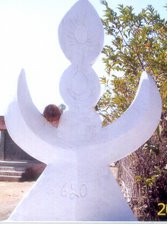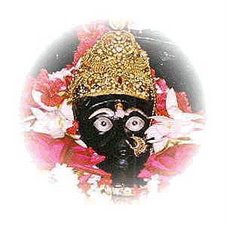Golwalkar Guruji: Superhuman Or Less Than Human?
He was known as 'guruji' (revered teacher). I find that at least in some vernacular papers he is being referred to as 'shreeguruji'. The addition of shree to his title guruji makes him nearly sacred, an avatar of sorts. Within the Maharashtrian context this has an additional meaning or signification. Mystic gurus are often referred to as 'shreeguruji'. You can see thus that there has been rather subtle glorification of Golwalkar, the new appellation making him stand a little above the human level. - GPD (March 25, 2006, EPW GPD, An Occasion for RSS) I.
It is said that masses have very short memories. For them it is easy to send today's icon into oblivion without much hair splitting or it is still easier for them to hail yesterday's monster as today's development man. But do classes or their intellectuals also suffer from similar amnesia? Looking at the important role played by them in the running of the society/state it is expected that they appear different. A recent writeup by one of the think-tanks of the right (Sudhindra Kulkarni, who also happened to be a 'ghost writer' for the ex deputy PM and was supposedly responsible for the 'iron leaders' speech at Jinnah Mausoleum) in the Sunday Express (11 th Feb 20007) belies this expectation.
One could also decipher that it is a deliberate ploy by the writer to obfuscate things. It is equally possible that he is trying to present his wishful thinking as in-depth analysis before the masses. Whatever may be the case, here we are presented with an analysis, which is not only bereft of historical facts but also appears to be another poor attempt at repackaging of a dangerous anti-human trend in Indian politics represented by the Hindu right. The writer talks about how things are moving or rather changing at RSS. And to buttress his point he mentions two things: the way the RSS has extended invitation to Ms Sonia Gandhi for the programme organized to commemorate the birth anniversary of Golwalkar and secondly, proposal by Madan Das Devi, to deliberate on the Sachar Committee report in the coming meeting of RSS and suggest some measures for the poor Muslims.
Definitely the pen pusher for the ex-Iron Man cannot be faulted for his weak memories, but he can definitely be advised to just flip through similar expectations harboured by the likes of Jayprakash Narayan and others and how they came to a naught. Perhaps he would be delighted to know when Janata Party came to power way back in 1977, an impression was created that the secretive RSS – which retains its Brahminical core intact - was even ready to admit even Muslims in its ranks. It took a lot of time for the genuinely concerned citizens to comprehend that all that was meant for mere public consumption. RSS, which found itself cornered then because of its not so glorious role in the emergency – when it had tried to undertake secret parleys with Ms Indira Gandhi or had even instructed its cadres put in jails to give written undertakings before the Emergency regime – had put forward this proposal to wriggle itself out of the situation. Perhaps the best thing for him would be to do look at the expectations entertained by a section of the liberal intelligentsia who had thought that a stint at power at the center would rather moderate the 'rabble rousers' and the way they got 'Modified'. II. Ofcourse anyone remotedly familiar with RSS would tell you that the RSS, which calls itself the biggest cultural organization on the face of the earth, is seriously trying to do a makeover.
It is a different matter that all these attempts focus not on the essence but the appearance of the organization, the challenge present before it in the wee hours of the 21 st century and they essentially get reduced to presenting a sanitized version of this project before the gullible masses. It was only last year that there was news in the section of the media about the brainstorming going on within RSS where many a topics vital for the sustenance and continuation of the organization were being discussed. Ranging from the 'greying' of the RSS Shakhas to the impact of the electronic channels on the attendance, ranging from the backward looking dress to the relevance of its ideology in times of globalisation everything was put under scanner. Interestingly one of the most serious problem which inadvertently or so, continued to bother the minds of the RSS bosses and continues to remain a focus of attention, concerns the 'moral degeneration' of its cadre. It is widely known that many of the leading cadres or their near and dear ones, are facing investigation for their dealings involving financial matters. While the world at large saw with its own eyes, its old Swayamsevak (who was later declared a failed one) Bangaru Laxman accepting wades of notes from a fraudulent arms dealer (thanks to the sting operation done by Tehelka), it also noticed that biggest contingent of MPs who faced expulsion because of similar sting operation, belonged to the Sangh only. The world has not forgotten why the ex-spokesperson of the RSS M.G. Vaidya ( who is considered a think-tank in the RSS parlance and expresses views which are still considered very much akin to the RSS patriarchs) had to resign from his post all of a sudden during NDA era itself, when media exposed the dubious role played by his son and daughter in law in a financial company. Perhaps the best example from the Sangh hierarchy could be that of Madan Das Devi, who still has been asked to maintain liason between the BJP and the RSS.
Tavleen Singh, a journalist said to be close to the RSS in a signed article 'Rashtriya Swayamseva Sangh' (Indian Express, 2003) had given details of Devi's very own son's involvement in the Petrol Pump Scam Of course as far as matters of financial wheeling and dealing are concerned, the involvement of people who are brought up in the Sangh tradition are numerous. As they say it in a Sanskrit Shloka 'Hari Ananta, Harikatha Ananta' one can go on presenting instances where people who wear their Sangh lineage on their sleeves had no compunction in even occupying land meant for Dalits for years together ( Venkaiah Naidu) or making a beeline for plots at prime locations in Delhi under fictitious trusts which were existing on mere paper. It is a different matter that RSS still has the audacity to call itself an organization committed to character building. While all such examples have definitely put a question mark over the moral high ground occupied by the RSS, the Sangh Patriarchs seem to be more disturbed with what can be called 'Sanjay Joshi Phenomenon'. The world very well knows how this powerful general secretary of the BJP ( loaned to it by RSS) had to make a ignominious exit recently when he was eased out of his responsibilities. The immediate cause for his exit because of a CD scandal, which refused to get settled despite his getting a 'clean chit' by the MP state government. For the uninitiated it might be told that Sanjay Joshi, who happened to be a senior Pracharak of the RSS, who was 'loaned' to the BJP some years back, faced axe on the eve of the silver jubilee celebrations of the party last year. The immediate cause for this action was the circulation of a CD, which allegedly showed him (or a lookalike) with a woman in a compromising position. Later he was given a clean chit by the MP government, supposedly after conducting an enquiry. Although he was promptly rehabilitated in the party, doubts continued to linger over the way the enquiry was hushed up. It is learnt that recently when new 'facts' relating to the CD episode came up, the party decided to ease him out of his responsibilities to save itself from further embarrassment. Very few people would know that the whole CD exposure was an intra-Parivar affair and none from the 'pseudo-secularist' camp was even blamed for it. A leading think tank of the RSS, M.G. Vaidya, in a signed article in a Marathi daily 'Tarun Bharat' had even written that the Sangh Patriarchs know who is behind the episode and if they wish the wrongdoers could be paid in the same coin. There were unconfirmed reports that the whole sting operation was done at the behest of the Chief Minister of a neighbouring state and one of his close female confidants supposedly to settle scores with Joshi. It was worth noting that a compromise within the 'warring factions' could be reached only after Mohan Bhagwat, another senior leader of the RSS intervened and settled the matter. Looking at the secretive nature of the organization and the clandestine manner in which it functions, there is no way one could get to know what conclusions have been drawn by the RSS patriarchs over the whole issue of 'moral degeneration'. Looking at the fact that Sanjay Joshi episode continued to simmer more than a year after the CD was made public, one can gather that the rot runs quite deep and the Parivar bosses are still looking for answers. Close watchers of the Sangh trajectory would vouch that the sting operation was rather a tip of the iceberg. It was worth noting that in the immediate aftermath of the 'ceasefire' reached between the warring factions of the Parivar, in connection with the Sanjay Joshi episode, 'Tehelka' did a story, where it provided details of an anonymous CD making rounds in the Sangh hierarchy, which allegedly showed another of its senior leaders in poor light. Interestingly while the 'moral degeneration' of the leaders might have become a cause of concern of late, it cannot be said that it is a recent phenomenon.
Balraj Madhok, a senior leader of the Bharatiya Jana Sangh, in his autobiography provides details of the lifestyles of senior leaders. Madhok, in his autobiography Zindagi Ka Safar, published in three parts presents vivid description of the way senior leaders functioned then and the manner in which the top bosses of the RSS, namely Golwalkar dealt with issues involving moral turpitude.. Balraj Madhok writes : Some time back when I was the President of the Jana Sangh, Jagadish Prasad Mathur, in-charge of the Central Office, who was staying with a senior leader at 30, Rajendra Prasad Road, had complained to me that the leader had turned that house into a den of immoral activities There everyday new girls were coming. Now water was flowing above heads. So as a senior leader of Jana Sangh I have dared to bring to your notice this fact. I had some information about character of the leader, but situation had deteriorated that much, I did not know. (Balraj Madhok, Zindagi Ka Safar – 3 : Deendayal Upadhyaya Ki Hatya Se Indira Gandhi Ki Hatya Tak, Delhi : Dinmaan Prakashan, 20003, p.22) He further provides details about Golwalkar's reaction to the whole episode as Madhok had discovered then that senior leadership of the RSS was bent upon making this particular leader President of the Bharatiya Jana Sangh. Discussing his meeting with Golwalkar, he tells : After listening to my talk he kept quiet for some time and then said –' I am in the know of the weaknesses of the character of these people. But I have to run an organization. I have to take everybody together, so like Shiva I drink poison everyday.(ibid p.62) III. Looking at the crisis of legitimacy, which the RSS is facing because of the moral degradation of its cadres, it deemed it necessary to present itself as 'moral exemplars of the nation' supposedly to lift the morale of its cadres and also repackage itself as a 'moderate' 'nationalist' organization. And the birth anniversary of its second Supremo called Madhav Sadashiv Golwalkar alias Guruji happened to be just that occasion. Since the birth centenary celebrations are moving towards completion, a question can naturally be asked whether it proved successful in 'repackaging itself' or it inadvertently opened up many questions before itself and is still struggling for answers. With hindsight one can say that it has been a mixed experience. While it could present a sanitized version of its activities or a defanged version of the second supreme before the masses with a lot of gusto, it has opened a pandora's box before itself as well. Reason being the impossibility of presenting repacked version of Golwalkar, the second Supremo, which would fit into the mood of the 21 st century. How could they carve out a 'Saint' from person who yearned for anti-human solutions to human problems, one who kept himself as well as the organization away from the surging anti-colonial struggle of the Indian masses, who was not only an unashamed supporter of Nazism and Fascism and till the end of his life who yearned for a society based on Manu's edicts. IV. RSS the biggest 'cultural' organisation on the face of the earth has had five supremos 'Sarsanghchalaks' since its inception. Starting from founder member Hedgewar and leading upto KS Sudarshan the present incumbent, the interregnum was filled by Golwalkar, Deoras and Rajendra Singh. If one takes a synoptic view of each of these periods then one can definitely discern the definitive impact each of them has had on the organisation. Ofcourse none of them proved as controversial as the second incumbent namely Madhav Sadashiv Golwalkar whose birth centenary is being celebrated by his followers this year. Coming to Golwalkar, his biographers tell us that Madhav Sadashiv Golwalkar got the alias Guruji for his brief stint in the zoology department of Banaras Hindu University in the early thirties as a teacher.
We are also told that he was a latecomer to the RSS, as he was more keen to undertake a spiritual journey via the Ramakrishna Mission. Despite his late entry to the organisation, he earned the confidence of the founder-member Hedgewar in a very short time supposedly because of his brilliance and sharpness of logic. It was logical that when the supremo breathed his last, he left a note asking his followers to make him the next Supremo.(1940) Golwalkar carried on with this responsibilities for a span of 33 years till his death, a period which saw lot of turmoil within the organisation and also witnessed a consolidation and expansion of the same via a network of organisations. Insiders to the organisation as well as many external wathchers agree to the fact that he could be considered the key figure who provided a theoretical background to the project of Hindutva and laid down the seeds of the vast organisational network. As of now the plethora of anushangik ( affiliated) organisations which owe allegiance to the ideology of Hindutva would run in hundreds, each catering to a section of society. Scholars as well as activists, who may posit themselves diametrically opposite vis-a-vis the weltanshauung of this Hindu Supremacist organisation , also need to study in detail the way an organisation which was on the margins of Indian society for a long time could reach the centrestage of Indian politics.
One still remembers how RSS people were made a butt of jokes in popular culture in Maharashtra especially --Marathi dramas in late sixties-early seventies - mainly because of their remaining limited to Brahmins or their insistence on mechanical style discipline. It is true that this era in RSS history it is long passe. Madhav Sadashiv Golwalkar spanned a period in world history, which could be said to be unique in many ways. It was a period when Nazism-Fascism was ready to swamp the whole of Western Europe, a period when national liberation struggles in many of the third world countries were near culmination and the great experiments of Socialist construction undertaken in Soviet Russia coupled with the rising tide of communist led militant movements were proving to be a defining characteristics of the era. Retrospectively one can say that it was such a juncture in world history when the old world of feudalism, colonialism, was crumbling down and a new world was emerging. And it would not be incorrect to state that due to his peculiar weltanschauung which yearned for building a Hindu Rashtra based on the 'glorious traditions of Hinduism' and which looked towards Muslims as bigger adversary vis-a-vis British colonialism and which sought inspiration from the experiments in 'social engineering' undertaken by Nazism-Fascism, he completely failed to have a pulse on the march of history. In fact due to his intransigence he not only kept himself personally aloof from the surging anti-colonial struggle but also did not chalk out any positive programme for his organisation to participate in it. As already mentioned the first of his theoretical contributions for the cause of Hindutva appeared in the form of a pamphlette called 'We or Our Nationhood Defined' (1938). It was so straightforward in its appreciation of the 'ethnic cleansing' of Jews undertaken by Hitler and such an unashamed proponent of the submergence of 'foreign races' in the Hindu race that later day RSS leaders have tried to create an impression that the said book was not written by Golwalkar but it was merely a translation of a book 'Rashtra Meemansa' by Babarao Savarkar. It is a different matter that in his Preface to We or Our Nationhood Defined dated March 22, 1939, Golwalkar himself described Rashtra Meemansa as 'one of my chief sources of inspiration and help. The American scholar Jean A. Curran who did a full length study on RSS in early fifties, in his sympathetic book, Militant Hinduism in Indian Politics: A Study of the RSS (1951) confirms that Golwalkar's 77-page book was written in 1938 when he was appointed RSS General Secretary by Hedgewar and he calls it as RSS's 'Bible'.A. G. Noorani in his famous book ' The RSS and the BJP: A Division of Labour, {Pgs. 18-39} Leftword Books) also tells us that :Rajendra Singh and Bhaurao Deoras made an authoritative statement on that book in Para 10 of their 1978 application: 'With a view to give a scientific base to propagate the idea India being (sic) historically from time immemorial a Hindu Nation, late Shri M.S. Golwalkar had written a book entitled, "We or Our Nationhood Defined",' In Para 7 they 'placed on record' his book Bunch of Thoughts (1966) in order 'to clarify and understand the true purpose, the exact nature, the ambit and scope of the RSS work… and its activities.' A quote from the 77 paged book would be opportune at this moment. "The foreign races in Hindusthan must either adopt the Hindu culture and language, must learn to respect and hold in reverence Hindu religion, must entertain no idea but those of the glorification of the Hindu race and culture, i.e., of the Hindu nation and must loose their separate existence to merge in the Hindu race, or may stay in the country, wholly subordinated to the Hindu Nation, claiming nothing, deserving no privileges, far less any preferential treatment — not even citizen's rights. There is, at least, should be, no other course for them to adopt. We are an old nation; let us deal, as old nations ought to and do deal, with the foreign races, who have chosen to live in our country". ( Madhav Sadashiv Golwalkar's, We or Our Nationhood Defined) A third arena where Golwalkar proved much behind his times was his love for Manusmriti's edicts. When leaders of newly independent India were struggling to have a constitution which was premised on the inviolability of individual rights with special provisions of positive discrimination for millions of Indians who had been denied any human rights quoting religious scriptures, it was Golwalkar again who espoused the same Manusmriti as independent India's constitution.'Organiser' ( November 30, 1949, p.3) the organ of RSS complained : But in our constitution there is no mention of the unique constitutional developments in ancient Bharat. Manu's laws were written long before Lycurgus of Sparta or Solon of Persia. To this day laws as enunciated in the Manusmriti excite the admiration of the world and elicit spontaneous obedience and conformity. But to our constitutional pundits that means nothing. When attempts were made under the stewardship of Ambedkar and Nehru in late forties to give limited rights to Hindu women in property and inheritance through the passage of the Hindu Code Bill , Golwalkar and his associates had no qualms in launching a movement opposing this historic empowerment of hindu women which was to take place for the first time in history. Their contention was simple : This step is inimical to Hindu traditions and culture. It was late '60s when Maharashtra witnessed a massive mobilisation of people, cutting across party lines, which was precipitated by a controversial interview given by Madhav Sadashiv Golwalkar, the then Supremo (Sarsanghchalak) of RSS, to a Marathi daily Navakal Golwalkar in this interview had extolled the virtues of Chaturvarnya (the division of the Hindus in four Varnas) and had also glorified Manusmriti, the ancient edicts of the Hindus. IV Delhi will host a Grand Programme to commemorate the birth anniversary of Golwalkar on the 18 th of February. In fact this massive programme is a culmination of the yearlong celebrations of the birth anniversary of the second Supremo, which started with a colorful programme held on 24 th February in Nagpur last year. We very well know that a team of 122 members, belonging to different spheres of social life, besides 53 prominent saints and spiritual leaders of the country as patrons, had been constituted for the birth-centenary year celebrations. Vice President of India, Bhairon Singh Shekhawat would preside over the function and many other dignitaries would speak on the occasion. As we know it had been decided to have 'social harmony' (samajik samrasta) as central theme of the yearlong celebrations during which Hindu rallies were organised at the block level all over the country For the followers of Golwalkar the birth anniversary of one of their Pratasmaraniya ( worth remembering in the morning) icons has also been an occasion to revisit that period during which the second supremo held sway. And surprisingly they are not finding themselves much comfortable with it for various reasons.
It is evident in the way in which on the one hand they are lauding him for his 'contributions' but are also simultaneously engaged in surreptiously sanitising him and presenting him before the guillible public under a more acceptable, humane face. Ofcourse not that they have second thoughts about the vision espoused by him, rather they have continued to show their adherence to it by organising the 'successful experiment' in Gujarat in 2002. The only problem they have is the presentation of the vision. Looking at his controversial pronouncements from time to time on various issues of social-political concern and his transcending the 'calculated ambiguity' on many a occasions which is a hallmark of the organisation which he built, it is not surprising that he has always come under barrage of attack from all those people/groups/organisations who differed with the weltanshaaung of the RSS or who oppose/d the project of Hindutva on various grounds. The feverish and foolish attempts undertaken by the Swayamsevaks to show that Golwalkar was not the author but basically the translator of the controversial book , the way in which they are engaged in presenting concocted proofs to show that they did participate in the independence movement ( while their very own Golwalkar Guruji had the audacity to make a fun of the tremendous sacrifices made by the people in the anti colonial struggle)or the way they have dedicated the year long celebrations in his honour to the cause of 'social harmony' all goes to show their keenness to present the Second Supremo in a Sanitised form. Their eagerness to present a more palatable Golwalkar was also evident when they went in for presenting a 'filmy' version of Golwalkar. Directed by ex-MP Nitish Bharadwaj ('Mahabharat' fame) the film tells us that it is a myth to say that RSS kept itself away from freedom struggle and in fact it had decided in its high level meeting to participate wholeheartedly in the struggle. (It is a different matter that till date one has not yet discovered a single freedom fighter who owed allegiance to RSS brand of Hindutva).
If one goes by this bollywoodian version of Sangh trajectory, you would know that Congress government led by Nehru had made frantic calls to the Sangh bosses for Gandhi's safety and a team of Swayamsevaks in fact happened to be brave enough to volunteer for his security. V Definitely no less troubling are Golwalkar's ideas around 'Hindu Experiments in Cross-breeding' which extolled North Indian Brahmins at the cost of the rest of the Hindus themselves and in fact propagates an idea that India had a superior race or breed of Hindus and also an inferior race of Hindus, which needed to be improved through cross-breeding. In his address to the School of Social Science of Gujarat University on December 17, 1960 ( Organiser, January 2, 1961, p.5) he formulated this racist thesis. Today experiments in cross-breeding are made only on animals. But the courage to make such experiments on human beings is not shown even by the so-called modern scientist of today. If some human cross-breeding is seen today it is the result not of scientific experiments but of carnal lust. Now let us see the experiments our ancestors made in this sphere. In an effort to better the human species through cross-breeding the Namboodri Brahamanas of the North were settled in Kerala and a rule was laid down that the eldest son of a Namboodri family would marry only the daughter of Vaishya, Kshatriya or Shudra communities of Kerala. Another still more courageous rule was that trhe first off-spring of a married woman of any class must be fathered by a Namboodri Brahmin and then she could beget children by her husband.
Today this experiment would be called adultery, but it was not so, as it as limited to the first child. As rightly noted by Dr. Shamsul Islam, in his book 'Golwalkar's We Or Our Nationhood Defined A Critique' ( 2006, Pharos Media, Delhi.pp. 30-31) 'The above statement of Golwalkar is highly derogatory in many respects. Firstly, it proves that Golwalkar believed that India had a superior race or breed of Hindus and also an inferior race of Hindus'..'Secondly, a more worrying aspect was the belief that only the Brahmins of the North, specifically Namboodri Brahmanas, belonged to a superior race." Whatever may be the ideas of every justice loving person about the anti-human core of Golwalkar, his continued valorization in the Sangh circles reminds one of a Sanskrit proverb : Nirastapadapedeshe Erandopi Drumayate! (In a treeless country even castor counts for a big tree!) -
Contact : subhash.gatade@gmail.com
Subscribe to:
Post Comments (Atom)







No comments:
Post a Comment